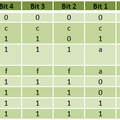The FunCPU (in its current version) supports only numerical computation, more precisely, operations with integers. Functional languages, such as Lisp, Clean, etc. come with a richer set of data types and also have some kind of type construct capability. For example, Lisp as its name suggests mainly operates with lists.
Moreover, the maximum number of arguments is limited to four. Four arguments are usually enough to demonstrate some simple, yet interesting mathematical functions, but more complex scenarios require usually more arguments.
Hereunder I will be sketching some workarounds to overcome the aforementioned limitations, but please beware that these will bear mainly theoretical relevance.
More Arguments
To increase the number of arguments supported, one can use any pairing function, which is a bijective function mapping two natural numbers to another. For instance, the Cantor pairing function is defined as follows:
P(x,y):=0.5 * (x+y) * (x+y+1) + y
Even more arguments can be encoded, if we use nested pairing functions, that is essentially use the Cantor tuple function. For more information please refer to:
http://en.wikipedia.org/wiki/Pairing_function
Lists, Records
Similarly, lists (or record-like structures) can be encoded using the so-called Gödel’s encoding, so that, a list or string of n consecutive characters is encoded as follows:
enc(x1, x2, …, xn) := 2^x1 * 3^x2 * … * Pn^xn, where Pn denotes the nth prime.
Obviously, due to the 7-bit architecture such encodings are rather limited, but still theoretically feasible.



